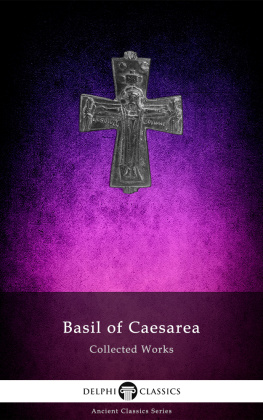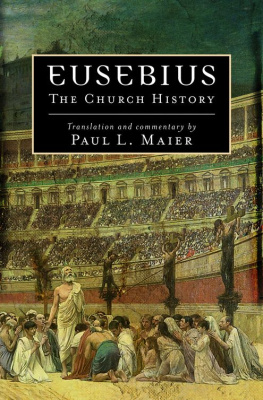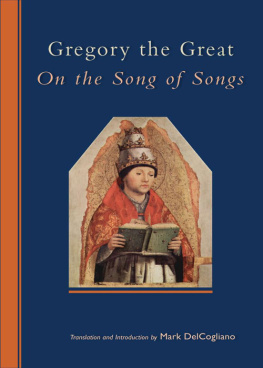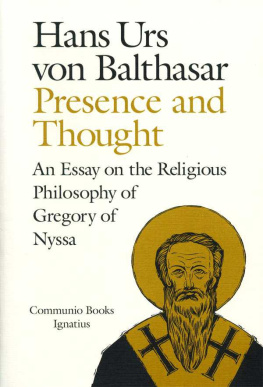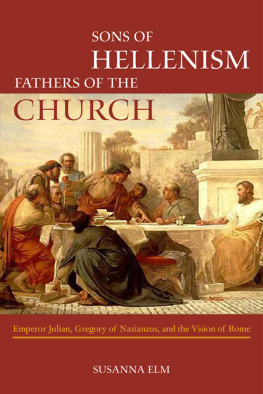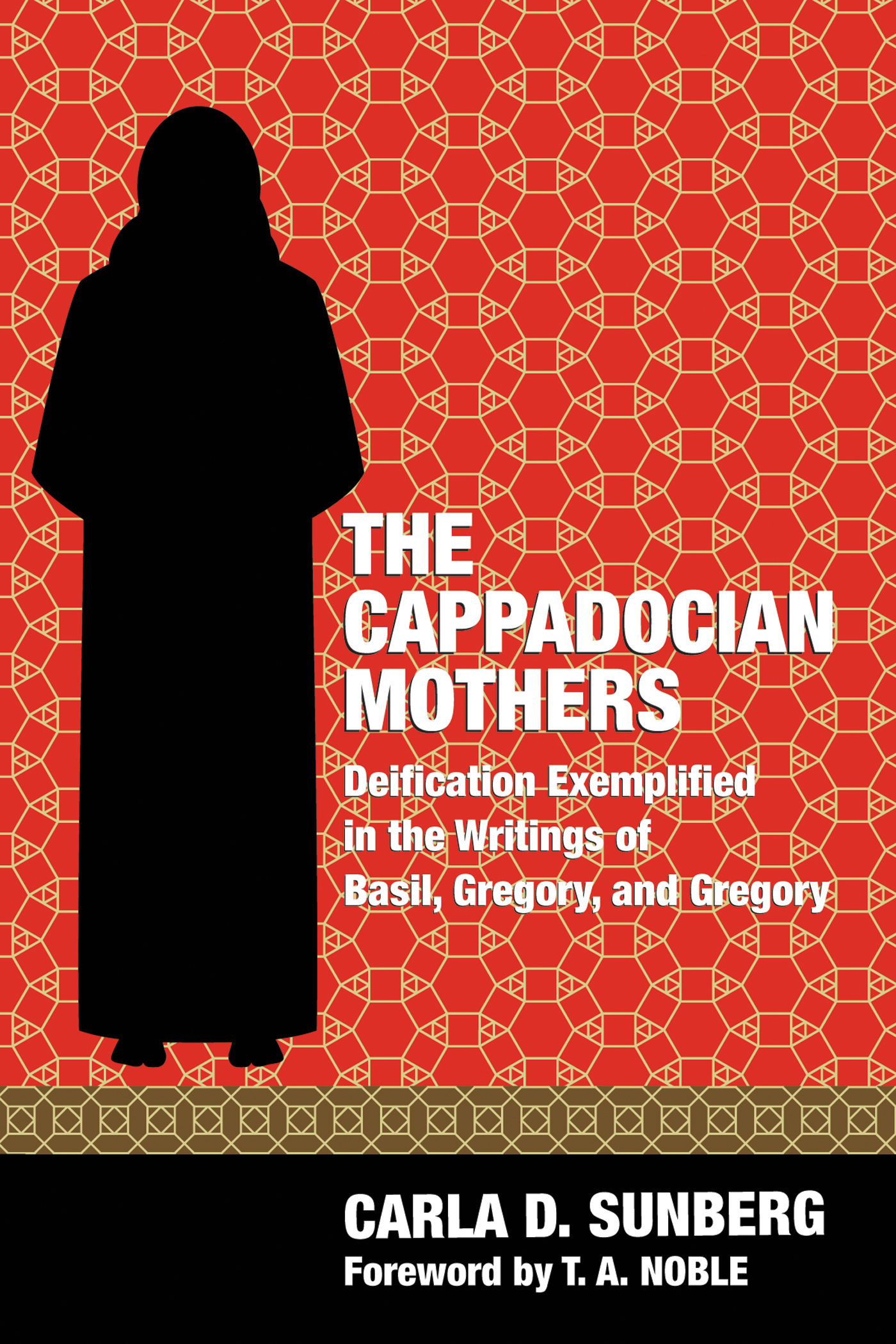The Cappadocian Mothers
Deification Exemplified in the Writings of Basil, Gregory, and Gregory
Carla D. Sunberg
foreword by T. A. Noble
The Cappadocian Mothers
Deification Exemplified in the Writings of Basil, Gregory, and Gregory
Copyright 2017 Carla D. Sunberg. All rights reserved. Except for brief quotations in critical publications or reviews, no part of this book may be reproduced in any manner without prior written permission from the publisher. Write: Permissions, Wipf and Stock Publishers, W. th Ave., Suite , Eugene, OR 97401 .
Pickwick Publications
An Imprint of Wipf and Stock Publishers
W. th Ave., Suite
Eugene, OR 97401
www.wipfandstock.com
paperback isbn: 978-1-4982-8241-3
hardcover isbn: 978-1-4982-8243-7
ebook isbn: 978-1-4982-8242-0
Cataloguing-in-Publication data:
Names: Sunberg, Carla D. | Foreword by Noble, T. A.
Title: The Cappadocian mothers : deification exemplified in the writings of Basil, Gregory, and Gregory / Carla D. Sunberg.
Description: Eugene, OR: Pickwick Publications, 2017 | Includes bibliographical references and index.
Identifiers: isbn 978-1-4982-8241-3 ( paperback ) | isbn 978-1-4982-8243-7 ( hardcover ) | isbn 978-1-4982-8242-0 ( ebook )
Subjects: LCSH: Christian women saintsBiography | Macrina, the Elder, Saint, -approximately | Macrina the Younger, Saint, approximately 330379 or | Cappadocian Fathers | Basil, Saint, Bishop of Caesarea, approximately 329379 | Gregory of Nazianzus, Saint | Gregory of Nyssa, Saint, approximately approximately | VirginityReligious aspectsChristianityHistory of doctrinesEarly church, ca. 30600
Classification: br1720.m22 s941 2017 ( print ) | br1720.m22 ( ebook )
Manufactured in the U.S.A. 04/19/17
Carla Sunberg presents powerful examples of womenmothers and sisterswho embodied and taught theosis, sometimes translated from the Greek as deification, or growth in holiness, Christ-likeness, and love. Weve only recently become aware of these ancient church women, and Sunberg unveils how their lives and teachings embody spiritually formative practices relevant today. The Cappadocian Mothers will inspire all who seek to live holy, Christ-like lives, full of love.
Don Thorsen, Professor of Theology, Azusa Pacific University Seminary
Well-versed in feminist hermeneutical methodology, Carla Sunberg has crafted a significant piece of historical retrieval. She has mined the writings of fourth-century Cappadocian Fathers to learn of the significant witness and influence of the women who helped shape their understanding of how one becomes a participant in the divine nature. Her meticulous research demonstrates that without these mothers in faith, the fathers would lack living witnesses for their formulation of early Christian understandings of Christology, mystical theology, and Trinitarian construction. Besides, these remarkable women challenged regnant notions of the inferiority of women. Sandberg has bridged a major gap in scholarship, and the whole church will profit.
Molly T. Marshall, President, Professor of Theology and Spiritual Formation, Central Seminary
History has provided stories of the men who became heroes of the Christian faith in Cappadocia. Stories of the women were simply pushed aside, partly because of the culture of the fourth-century Roman Empire. Dr. Carla Sunberg brings to the forefront seven women who had significant impact on those men church history has hailed as heroes. But it isnt just that these women influenced the patristic church; rather, theyre lives were used as illustrations of theosis , Christ in me the hope of glory: our human process of becoming like Christ as we seek to follow Christ closely. This informative, well-researched, and accessible volume is important for women and men, pastors and teachers, historians and storytellers.
MaryAnn Hawkins, Dean, Anderson University School of Theology and Christian Ministry
In this volume on The Cappadocian Mothers , Carla Sunberg has provided a great gift to the modern church, and its release cannot be more timely. At the dawn of the twenty-first century, the ancient Cappadocian witness of the possibility of living a life characterized by ever-greater participation in God speaks to a growing hunger among Christians for living and vibrant faith. In addition to this hunger for knowing and living in God, there are many of us who hunger to hear the voices of our mothers in the faith as well as the voices of our fathers. While the first part of The Cappadocian Mothers is a treasure trove of ancient wisdom, the latter part brings it home to the life of contemporary Christians. Sunberg addresses issues such as gender and class equality, women in ministry leadership, as well as how the life of theosis is grounded in the Christian household.
Cheryl Bridges Johns, Robert E. Fisher Chair of Spiritual Renewal & Christian Formation, Pentecostal Theological Seminary
To the great men in my life:
My husband, Chuck Sunberg, without whom this never would have come about,
My father, Jerald D. Johnson, who has been my champion.
To the women in my life who lived in the model of the great Cappadocian Mothers:
My grandmother, L. Marie Johnson, a Godly woman who had more skills and abilities than the world could handle at her time;
My mother, Alice Johnson, who was the equal partner of her husband, the priest;
My mother-in-law, Thelma Sunberg, a modern-day Nonna who dedicated her life in prayer for her children, all five of whom have given their lives in service to the Lord.
Foreword
E very student of Christian theology, even if only a dilettante, has heard of the Cappadocian Fathers. But who were the Cappadocian Mothers?
The Fathers of the church were those bishops and teachers of the first six centuries who formulated the doctrines of the faith summarized in the creeds. And the Cappadocian Fathers were those three great bishops of the province of Cappadocia in the fourth century, two brothers and their friend, who played a key role in shaping the final form of the Nicene Creed. Basil was archbishop of Caesarea, the capital of the province of Cappadocia in the Greek-speaking Eastern Roman Empire (found today in central Turkey). As a student in Athens, he had become a close friend of Gregory from Nazianzus, who eventually was to become the archbishop of Constantinople, the eastern imperial capital. Nazianzen was the great poet and orator who went to the city to win it over to the orthodox Christian faith in the full deity of Christ. He is famous for his great Theological Orations on the Holy Trinity and was given the title of The Divine or The Theologian along with the Apostle John. The other Gregory was the younger brother of Basil, educated at home on the family estate, appointed bishop of Nyssa by his older brother as part of an ecclesiastical power struggle. He outshone both his elders as the great Christian philosophical theologian of his day.
But who were the Cappadocian Mothers?
Dr. Carla Sunberg, in this book, rich in theology, spirituality, and patristic scholarship, provides an introduction to these influential women. In brief, they were the mothers and sisters of these three great doctors of the church. And what the book demonstrates is that, although the Fathers have had all the fame, it was these Mothers who shaped their character. Basils grandmother, Macrina, his mother, Emelia, and his older sister, Macrina, were the strong influences on his life and that of his younger brother, Gregory. They called the younger Macrina their teacher. It was Gregory Nazianzens mother, Nonna, who won his father to the Christian faith and gave her son a Christian upbringing, and it was his sister, Gorgonia, who exemplified for him in her suffering the holy life. In addition there were Basils two younger sisters, Theosebia and one whose name we do not know who went back on her vows of virginity to be married.


